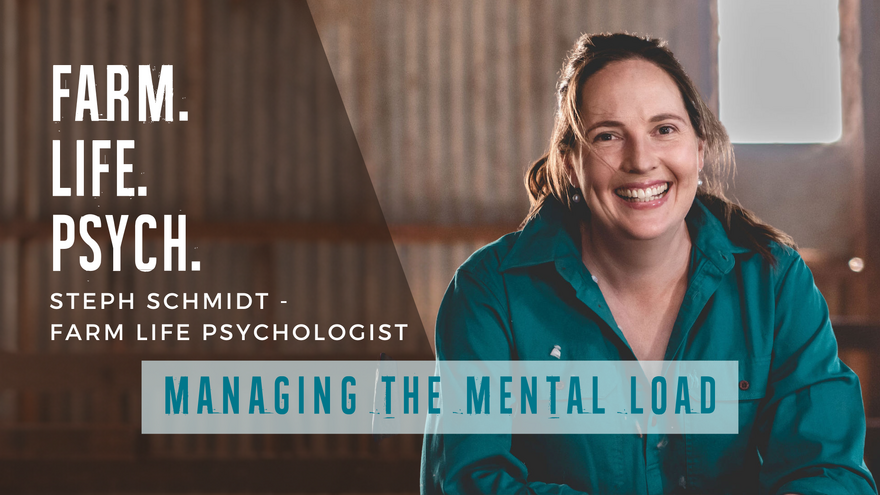Managing the Mental Load on the Farm: Practical Strategies to Ease the Pressure

As we all know, farming isn’t just a job—it’s a way of life, filled with both incredible highs and challenging lows. Right now, many of us are dealing with the tough realities of a difficult season: dry conditions, frost damage, and endless “what ifs.” It’s a lot to carry, and when you add in the regular pressures of family, finances, and relationships, it’s no wonder that so many of us feel overwhelmed.
I’ve been right there with you. Over the past few weeks, I’ve been thinking a lot about the mental load that we all carry. It’s not just about what’s happening in the paddocks—it’s about the constant noise in our heads. Those nagging thoughts of what could have been or what should we do next? can start to take over, leaving us feeling anxious, exhausted, and stuck.
That’s why in this week’s episode of Farm Life Psych with Steph Schmidt, I wanted to focus on some practical strategies we can all use to manage the mental load. These are tools I’ve been using myself, and I think they might just help you find a little more breathing room, even during tough times.
Strategies for the Mental Load
1.Start by Checking In With Yourself
One of the most helpful practices is to start with a simple check-in. Before diving into the next task on your to-do list, take a moment to ask yourself:
How am I feeling right now?
What’s my body telling me?
Where is my mind right now?
We get so caught up in everything that needs to be done that we forget to pause and check in with ourselves. But taking this moment of self-awareness can help ground you. It’s a way of acknowledging your feelings and noticing how the stress might be affecting you physically.
This is something you can do anywhere—while waiting to pick the kids up from school, before heading out to the paddocks, or even while grabbing your morning coffee. It doesn’t have to be a big ritual, just a quick moment to check in and breathe.
2. Managing Mental Noise: Cognitive Defusion
If your mind is anything like mine, it’s constantly running through a list of what ifs and should haves. This mental noise can get overwhelming fast, especially when you’re dealing with things outside of your control, like the weather.
One strategy that’s been a game changer for me is cognitive defusion. This is a technique where you literally acknowledge your thoughts for what they are—just thoughts. Rather than letting them spiral or take over, you can say, “I’m having the thought that…” and name it. For example, “I’m having the thought that this season is going to be tough,” or “I’m having the thought that I should have done something differently.”
By doing this, you create a bit of distance between yourself and the thought, making it easier to manage. It’s not about getting rid of these thoughts—they’re part of life—but it’s about not letting them consume you.
Don't just take my word for it, do a little experimenting and try it out for yourself.
Think one of the thoughts that tends to get you stuck.
As you think it, just observe what happens in your body. Put your curious scientist hat on.
What do you notice?
Now, you're going to make one small change. In front of that tricky thought, pop the phrase "I'm having the thought that..."
Again, observe and notice what happens when you make that small change. What do you notice?
3. Take Micro Pauses Throughout the Day
Farm life often feels like driving full speed down a long, straight road. We keep going and going, barely stopping to catch our breath. But when the road gets twisty, it’s important to slow down—just like when life gets tough, we need to give ourselves permission to pause.
One of the easiest ways to do this is to take micro pauses throughout your day. It can be as simple as feeling your feet on the ground, taking a deep breath, and focusing on the present moment. These small pauses help to reset your mind and body, reducing the buildup of stress.
Even if it’s just for a minute or two, these pauses can make a big difference. Think of it like pressing the brakes when the road gets windy—it gives you a little more control and helps prevent burnout.
4. You Don’t Have to Be Tough All the Time
Here’s something I’ve been reflecting on a lot lately: the idea that we need to be tough and resilient all the time. It’s a common message in farming, but the truth is, none of us can be strong 24/7. We don’t have to be.
It’s okay to struggle, and it’s okay to not have all the answers. While the saying might be, “Tough times won’t last, but tough people do.” I think we can fix that,
"Tough times won't last, but people do"
We all have the capacity to get through hard times, but that doesn’t mean we have to push ourselves to the breaking point.
So, give yourself permission to take a break when you need it. Acknowledge that it’s normal to feel overwhelmed, and don’t be afraid to lean on others for support. It’s okay to not be okay all the time.
Wrapping Up: Take One Small Step
If you’re feeling the weight of the mental load right now, I encourage you to try just one of these strategies this week. Whether it’s checking in with yourself, using cognitive defusion to name your thoughts, or taking small pauses throughout your day, every little step counts.
It doesn’t have to be perfect, and you don’t need to do everything all at once. But by practicing these strategies, you might find a little more space to breathe, even when life on the farm feels overwhelming.
As always, I’d love to hear how you’re going. Feel free to reach out, share what’s on your mind, and let me know what’s been helpful for you. Together, we’ll get through this—one step at a time.


1 comment
Great insights. Meditation really helps in distance oneself also!
Have a great day
Fred
Flower delivery Norway
Leave a comment
Please log in or register to post a comment